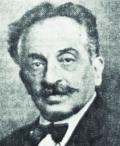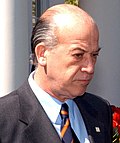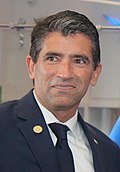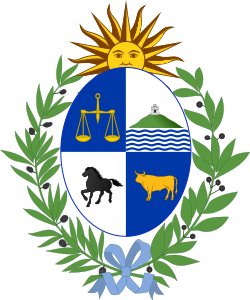| No. | Portrait | Name
(Birth–Death) | Term of office | Political
party | Elections | President | Notes
|
|---|
| Start | End |
|---|
| 1 |  | Alfredo Navarro
(1868–1951) | 18 May 1934 | 19 June 1938 | | Colorado | — | Gabriel Terra | Elected by the 3rd National Constituent Convention. |
|---|
| 2 |  | César Charlone
(1895–1973) | 19 June 1938 | 1 March 1943 | | Colorado | 1938 | Alfredo Baldomir | |
|---|
| 3 |  | Alberto Guani
(1877–1956) | 1 March 1943 | 1 March 1947 | | Colorado | 1942 | Juan José de Amézaga | |
|---|
| 4 |  | Luis Batlle Berres
(1897–1964) | 1 March 1947 | 2 August 1947 | | Colorado | 1946 | Tomás Berreta | Assumed the presidency after the death of Tomás Berreta. |
|---|
| 5 |  | Alfeo Brum
(1898–1972) | 2 August 1947 | 1 March 1951 | | Colorado | — | Luis Batlle Berres | Assumed the Vice Presidency as first senator of the most voted party. |
|---|
| 1 March 1951 | 1 March 1952 | | Colorado | 1950 | Andrés Martínez Trueba | The post of President and Vice President were replaced by the National Council of Government. |
Post abolished
1 March 1952 – 1 March 1967 | National Council of Government | |
| 6 |  | Jorge Pacheco Areco
(1920–1998) | 1 March 1967 | 6 December 1967 | | Colorado | 1966 | Óscar Diego Gestido | Assumed the presidency after the death of Óscar Diego Gestido. |
|---|
| 7 |  | Alberto Abdala
(1920–1986) | 6 December 1967 | 1 March 1972 | | Colorado | — | Jorge Pacheco Areco | Assumed the Vice Presidency as first senator of the most voted party. |
|---|
| 8 |  | Jorge Sapelli
(1926–1996) | 1 March 1972 | 27 June 1973 | | Colorado | 1971 | Juan María Bordaberry | Ousted from office by a coup d'état . |
|---|
Vacant
27 June 1973 – 1 March 1985 | Civic-military dictatorship | |
| 9 |  | Enrique Tarigo
(1927–2002) | 1 March 1985 | 1 March 1990 | | Colorado | 1984 | Julio María Sanguinetti | |
|---|
| 10 |  | Gonzalo Aguirre Ramírez
(1940–2021) | 1 March 1990 | 1 March 1995 | | National | 1989 | Luis Alberto Lacalle | |
|---|
| 11 |  | Hugo Batalla
(1926–1998) | 1 March 1995 | 3 October 1998 | | Colorado | 1994 | Julio María Sanguinetti | Died in office. |
|---|
| 12 |  | Hugo Fernández Faingold
(1947–2025) | 3 October 1998 | 1 March 2000 | | Colorado | — | Assumed the Vice Presidency as first senator of the most voted party. |
|---|
| 13 |  | Luis Hierro López
(1947–) | 1 March 2000 | 1 March 2005 | | Colorado | 1999 | Jorge Batlle | |
|---|
| 14 |  | Rodolfo Nin Novoa
(1948–) | 1 March 2005 | 1 March 2010 | | Broad Front | 2004 | Tabaré Vázquez | |
|---|
| 15 |  | Danilo Astori
(1940–2023) | 1 March 2010 | 1 March 2015 | | Broad Front | 2009 | José Mujica | |
|---|
| 16 |  | Raúl Sendic Rodríguez
(1962–) | 1 March 2015 | 13 September 2017 | | Broad Front | 2014 | Tabaré Vázquez | Resigned. |
|---|
| 17 |  | Lucía Topolansky
(1944–) | 13 September 2017 | 1 March 2020 | | Broad Front | — | Assumed the Vice Presidency as second senator of the most voted party, as the first senator of the most voted party, José Mujica, can only be President or Vice President until 5 years after his term ends. |
|---|
| 18 |  | Beatriz Argimón
(1961–) | 1 March 2020 | 1 March 2025 | | National | 2019 | Luis Lacalle Pou | Became the first woman elected to this position. |
|---|
| 19 |  | Carolina Cosse
(1961–) | 1 March 2025 | Incumbent | | Broad Front | 2024 | Yamandú Orsi | |
|---|




















